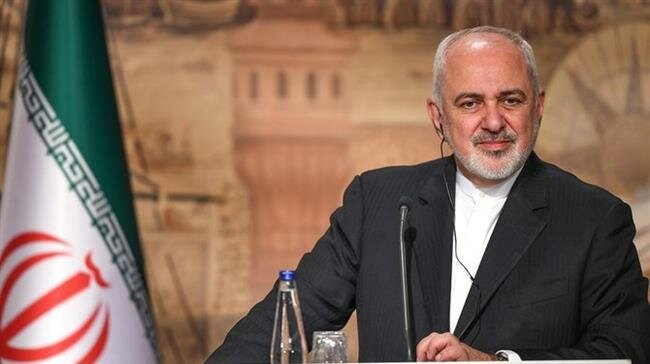Iran welcomes neighbors leaving B-Team: Zarif

“The B-team is shrinking in members. We welcome our neighbors leaving the team,” Zarif said in a press conference held on the occasion of the national journalists’ day, adding “we have always been ready to hold talks with our neighbors. Iran, Iraq and the six countries of the Persian Gulf Cooperation Council need to have talks with one other and sign the non-aggression pact.”
The “B-team” is a term popularized by Zarif. It refers to a group of politicians who share an inclination toward potential war with Iran, and the letter “b” in their names. They include US National Security Adviser John Bolton, Israeli Prime Minister Benjamin Netanyahu, Saudi Crown Prince Mohammed bin Salman, and Abu Dhabi Crown Prince Mohammed bin Zayed Al Nahyan.
Speaking to Iranian and foreign press on Monday, Zarif said in the world today, the discourse of “peace, multilateral and dialogue" is facing off the discourse of “bullying, terrorism and lawbreaking”.
Stressing that ‘economic terrorism’ is a reality, he said “economic terrorism is when you target ordinary people. The US government says if the Iranian nation wants to feed, the country needs to change its policies. This is economic terrorism: to tie the ‘bread’ to ‘politics’.”
Stressing that Iran will never “purchase its security and progress”, Zarif said “our security and progress stem from our own people. No matter how much pressure they put on us, we walked on our own path and succeeded because we relied on our people.”
“We are standing tall. We developed our own missiles and managed to shoot down the US spy drone. The enemies cannot stop Iran’s progress with sanctions and pressure,” stressed Zarif.
Zarif then maintained that imposing sanction on a country’s foreign minister means “failure in negotiations, failure in diplomacy, and an opposition to dialogue.”
The administration of US President Donald Trump imposed sanctions on Zarif on July 31, saying in its statement that Zarif is Iran's "primary spokesperson around the world," and that the ban "is sending a clear message that Iran's "recent behavior is completely unacceptable.”
The measure was condemned by the EU, which said it would continue working with Zarif despite the US sanction.
“We have nothing against the American people,” said Zarif. “They are afflicted by a culture of bullying, violence and gun-wielding. They are afflicted by a culture that talks of war as an option on the table. This is not an acceptable culture, and that is why the US authorities have to resort to sanctions.”
The US is behind tensions in the Persian Gulf and the world, said Zarif, adding “whoever is breaking out fire cannot be a firefighter. Every time the US came to the Persian Gulf, it brought nothing but violence and war.”
Talking about the seizure of Iran-operated oil tanker, Grace 1, by British Royal Marines in Gibraltar on July 4, Zarif deemed it an act of piracy, saying “the UK’s claim that the seizure was based on an EU decision was wrong. Although it is none of their business, but I will say once again that the tanker had not been headed to Syria, contrary to UK’s claim.”
In carrying out our responsibilities in the Persian Gulf, sometimes we would overlook certain violations, said Zarif, adding “but today, we see no reason to ignore the UK’s violation and act of piracy.”
“Britain is an accomplice in US’ economic terrorism, and this complicity will definitely bring about consequences for them,” he added.
Zarif then discussed the Iran nuclear deal, officially known as JCPOA, and the country’s decision to reduce commitments after the US’ unilateral withdrawal from the agreement and the E3’s lack of any practical measure to safeguard Iran’s economic interests in the face of US sanctions.
He stressed that Iran’s third stage of reduction in commitments does not mean the last step or Iran’s withdrawal from the agreement; rather, it is completely within the framework of the JCPOA.
“JCPOA is not sacred, and if needed, we will withdraw from it. But for now, I see no need in doing so.”
“We can have a much more extensive nuclear program than what we had prior to the JCPOA, but the other sides will never be able to form the same consensus against Iran again,” he said.
Source:Mehr News Agency
















